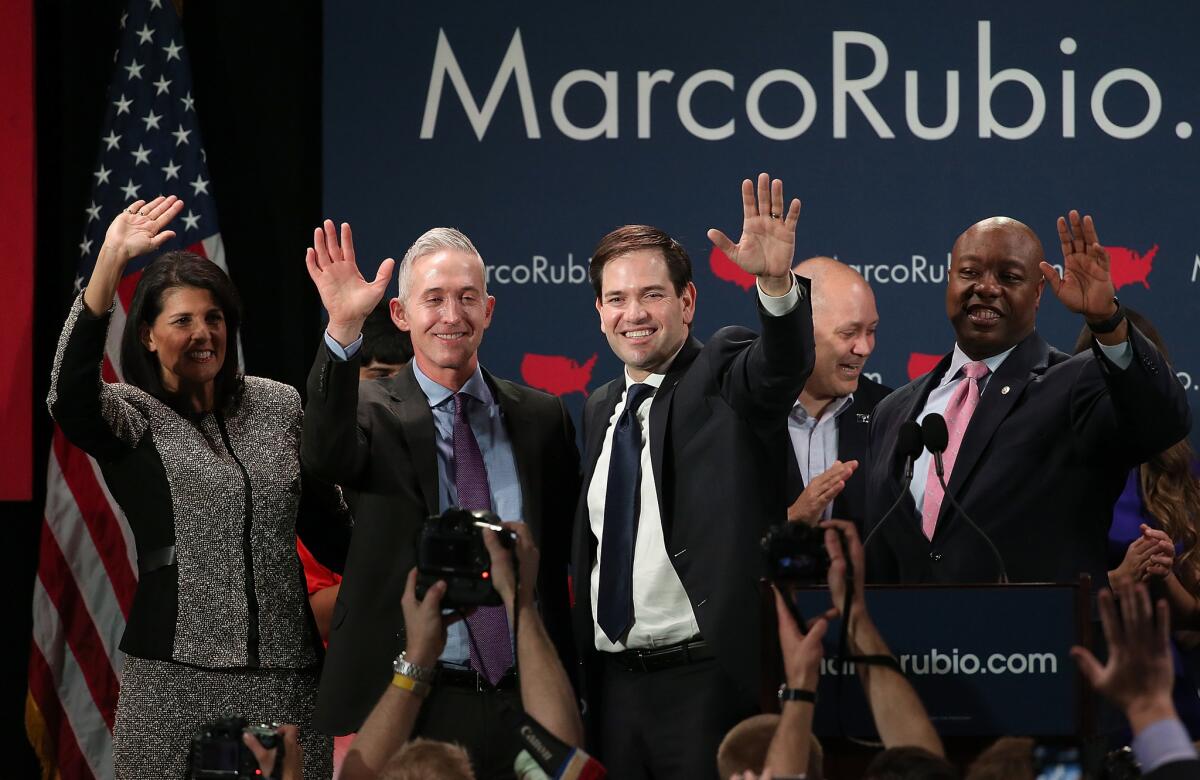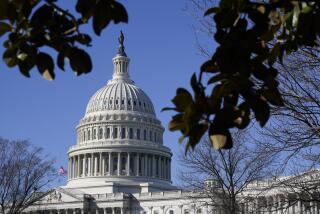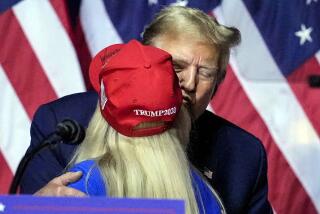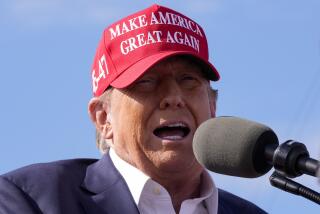Rubio and Cruz scramble to scoop up donations as Republican race broadens to more states

Republican presidential candidate Marco Rubio, second from right, celebrates with, left, South Carolina Gov. Nikki Haley, Rep. Trey Gowdy (R-S.C.) and Sen. Tim Scott (R-S.C.) at a primary night rally on Feb. 20 in Columbia, S.C.
As the rambunctious race for the Republican presidential nomination transforms into a more nationally oriented contest, Marco Rubio and Ted Cruz are battling not only for political dominance but also much-needed campaign cash to take on front-runner Donald Trump and blitz the airwaves to reach voters in a bevy of states.
The campaigns turn to Nevada briefly for its caucuses this week, but one week later looms Super Tuesday, when Republican voters in a dozen states will make their choices. Cruz has the advantage of more than twice as much cash as Rubio, but he also faces greater pressure to make gains in those mostly Southern states, especially on his home turf of Texas, with his conservative and religious message.
Rubio was catapulted forward not only by his second-place finish behind Trump in South Carolina, but also by the anticipation that high-dollar donors will flip to him after former Florida Gov. Jeb Bush exited the race following a poor showing. Rubio aides spent Sunday aggressively scooping up funders loyal to Bush, who now see the youthful-looking Latino as the GOP’s best hope to coalesce behind a candidate to take on Trump.
“I started getting phone calls from people within my group of donors saying, ‘Where do we go now? We’ll go where you go,’” said Bobbie Kilberg, an influential GOP donor from Virginia who had been along with her husband, Bill, finance co-chairs for Bush. The couple decided Sunday morning that they would join Rubio’s campaign.
“He has the best – and perhaps the only – chance now of coalescing the mainstream part of the party and hopefully winning the nomination and being the one person who I think can take on Bernie Sanders or Hillary Clinton,” she said.
See more of our top stories on Facebook >>
The money race is crucial to keep the campaigns competitive with Trump, the celebrity billionaire who has dominated the Republican contest mostly on his own dime, with a big assist from free media attention, deeply concerning GOP officials that he is on an unstoppable march to the party’s nomination.
Wealthy donors, though, are showing some reluctance to pile more money into a fluctuating field that still has five candidates, especially after Bush supporters ferried $118 million to a super PAC backing him with little to show for the investment. The Bush campaign itself raised an additional $31 million.
In Nevada, the state’s most sought-after funder, casino magnate Sheldon Adelson, is not yet jumping in. And the industrialist Koch brothers’ network of well-financed groups is also remaining on the sidelines.
“The question a lot of donors are asking is, ‘Where’s the accountability?’” said one Republican strategist not aligned with any campaign who would discuss donors’ concerns only on condition of anonymity. “I think donors feel a little burned.”
Campaigns can burn up as much as half a million dollars a day in the 10 days between now and March 1, when the big collection of states up for grabs will offer a sizable number of delegates and perhaps the momentum that would come from a strong showing in the South.
Cruz’s grass-roots army of small-dollar donors has consistently funneled more money to the Texas senator’s campaign than any other GOP candidate’s donors. He has $19 million in cash on hand, his spokeswoman said.
But Cruz faces more pressure to chalk up wins in the Southern states after a disappointing showing in South Carolina, when evangelicals flocked to Trump. The Texan fell 1,000 votes behind Rubio for a third-place finish.
His conservative religious and tea-party-inspired message has the best chance to resonate with voters in the South, especially in his delegate-rich home state of Texas.
Kellyanne Conway, who runs one of the large super PACs supporting Cruz, is ready with new ads against Rubio – including on his absenteeism from the Senate – after having spent $9 million so far to pump up Cruz and attack his rivals.
Also promising fresh warfare is a Rubio-backed super PAC, Conservative Solutions, coming out with a “multi-state, multimillion-dollar advertising effort” beginning Tuesday, spokesman Jeff Sadosky said in a memo.
Hopes are lower for Rubio in the South, where he is expected to do best in the suburban and white-collar professional exurbs outside Atlanta and in northern Virginia, giving him time to replenish his war chest before his next big must-shine challenge in his home state of Florida on March 15.
Bush’s departure should open doors for Rubio, even though the two campaigns were engaged in a fierce rivalry. And he needs the money, having just $5 million cash on hand, and operating on a shoestring budget in the last months as big money flowed to Bush.
“My phone was blowing up last night and this morning with Jeb Bush supporters coming over,” said Nick Iarossi, a fundraiser for Rubio. “All of the Jeb supporters [have] Marco as their second choice.”
Others, though, are skeptical that frustrated Bush backers, particularly those who gave big checks to a pro-Bush super PAC, will easily do the same for Rubio. Rubio has scheduled a fundraising swing to California in mid-March, a person close to the state’s donors said.
“Bush had some very loyal” donors, said Cruz campaign manager Jeff Roe, who called it “kind of fool’s money” to assume wealthy donors will easily give again.
Although Bush’s departure dramatically narrowed the Republican field by removing a substantial candidate, the race remains crowded.
Ohio Gov. John Kasich barely competed in South Carolina, pushing instead on to states in the Midwest and Northeast more hospitable to his more moderate brand of conservatism.
Ben Carson, the neurosurgeon who finished last in South Carolina, is pressing forward to the other Southern states, where he enjoys a following from conservative religious voters.
Those candidates may not have the cash to seriously compete, but they probably have enough to stay afloat – and that draws votes that could help coalesce the GOP behind a candidate who could directly confront Trump.
Trump, meanwhile, has few money woes as the real estate and casino magnate is largely self-financing his presidential bid without deep reliance on the donor dollars the other candidates need to pay staff and gas up their planes.
Twitter: @LATSeema and @lisamascaro
ALSO
How Jeb Bush went from favorite to also ran in eight humiliating months
Analysis: Democrats move left, Republicans move right, middle ground disappears
Why neither Hillary Clinton nor Bernie Sanders can claim a win in the Latino vote in Nevada
More to Read
Start your day right
Sign up for Essential California for news, features and recommendations from the L.A. Times and beyond in your inbox six days a week.
You may occasionally receive promotional content from the Los Angeles Times.








